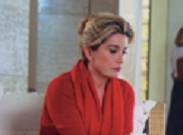|
|
||||
|
|
by Donald Levit  Changing Times/Les Temps qui changent, opening here Bastille Day after a two-year wait, brings together Catherine Deneuve and Gérard Depardieu as once passionate unmarried lovers who cross paths thirty years later. When Deneuve, who was 61 during filming, casts a quick self-appraisal about having “a body that I don’t like,” and is right, you know that time has passed. Portly, conservatively suited, bespectacled Gérard Depardieu -- age 56 at the time -- visually seconds the impression. The reunion is not accidental, for Antoine Lavou (Depardieu) has been searching for the woman that long, while he rose from skinny poverty to engineering success in Mali, Turkey, the Philippines, Chile and, having located her, now on requested assignment to hurry along construction of Medi Sat1, a major media-television center in Tangiers. With a younger second husband in Nathan (Gilbert Melki), a not remarkably successful doctor from The two long-ago lovers are the focus of it all. He has been sending her anonymous roses for a while, which she unknowingly gives or throws away, and after they do meet -- at a supermarket, where he nearly breaks his nose in an embarrassing accident -- she assumes, or convinces herself, that, their physical fires long burned out, they remain no more than awkward friends. He, au contraire, has been faithful to the idea of the Ideal and takes it as a simple matter of course that sex and love have little to do with one another, that love -- their love -- survives fate and time for eternity. Though his rôle is played extremely low-key, this concept of his is the heart of the tale. So much so that, with reinforcement in the Dylan-echo title, references to Muslim-world strife and scenes of dark sub-Sahara refugees desperate for Europe are conspicuously backgrounded in but then just ignored, and several subplots are allowed to go too far to be brushed aside like irrelevant cobwebs. Structural carelessness shows, too, in director-cowriter André Téchiné’s development. For no reason under the North African sun except, perhaps, arty fashionableness, the story is flashback, easily forgotten at that, opening with a different accident that the rest of the ninety-eight minutes will lead up to right after some unwarranted cinematic fireworks. Bilingual doctor Nathan is unobtrusively aware of his cultural roots, easygoing in contrast to his bickering French wife’s unhappy seriousness, loose in his live-and-let-live sexual morals and blithely unaware, as she is not, of their son’s homo- or bi-sexuality. Immediately tense again with his mother, redheaded son Sami (Malik Zidi) arrives from Posited as a devout Muslim and self-proclaimed man-hater, slaving to support their mother, this sister theoretically avoids the returnee out of fear of her Europeanized ways. Inconsistently imagined, she is leery of being seen in public with a man, even a countryman, yet sheds robe and hijab headscarf for baseball cap and jeans while working in McDonald’s, handling fast-food products and a mixed public, and is not shy about lonely country drives with a male she has just met, watching him disrobe and swim and, it seems, becoming his lover and maybe second wife. These secondary stories occupy much of the film though are never brought to any conclusion -- rehab and a ménage à trois in But circumstances as much as anything will bring about the success denied to pure faithfulness. Dreams, he remarks apropos of her radio coworker (Tanya Lopert, as Rachel Meyer), are easier than reality, and maybe her brief “break” can become their enduring “future.” (Released by Koch Lorber Films; not rated by MPAA.) |
||
|
© 2024 - ReelTalk Movie Reviews Website designed by Dot Pitch Studios, LLC |



